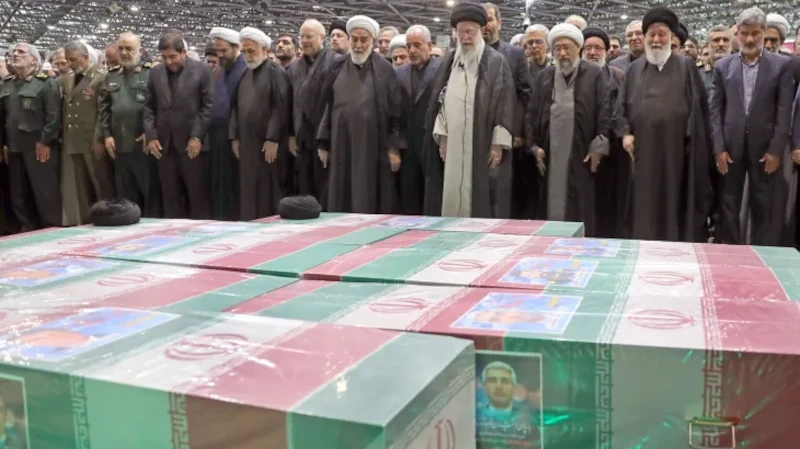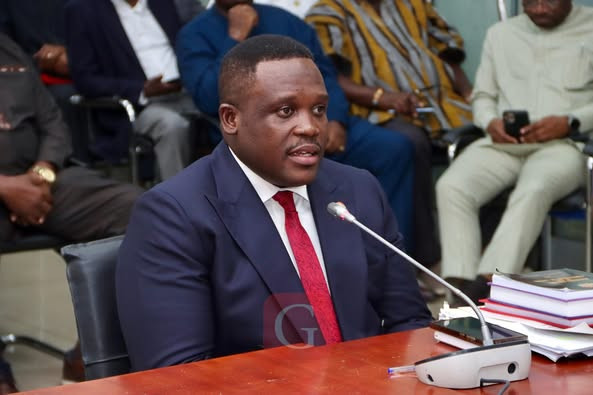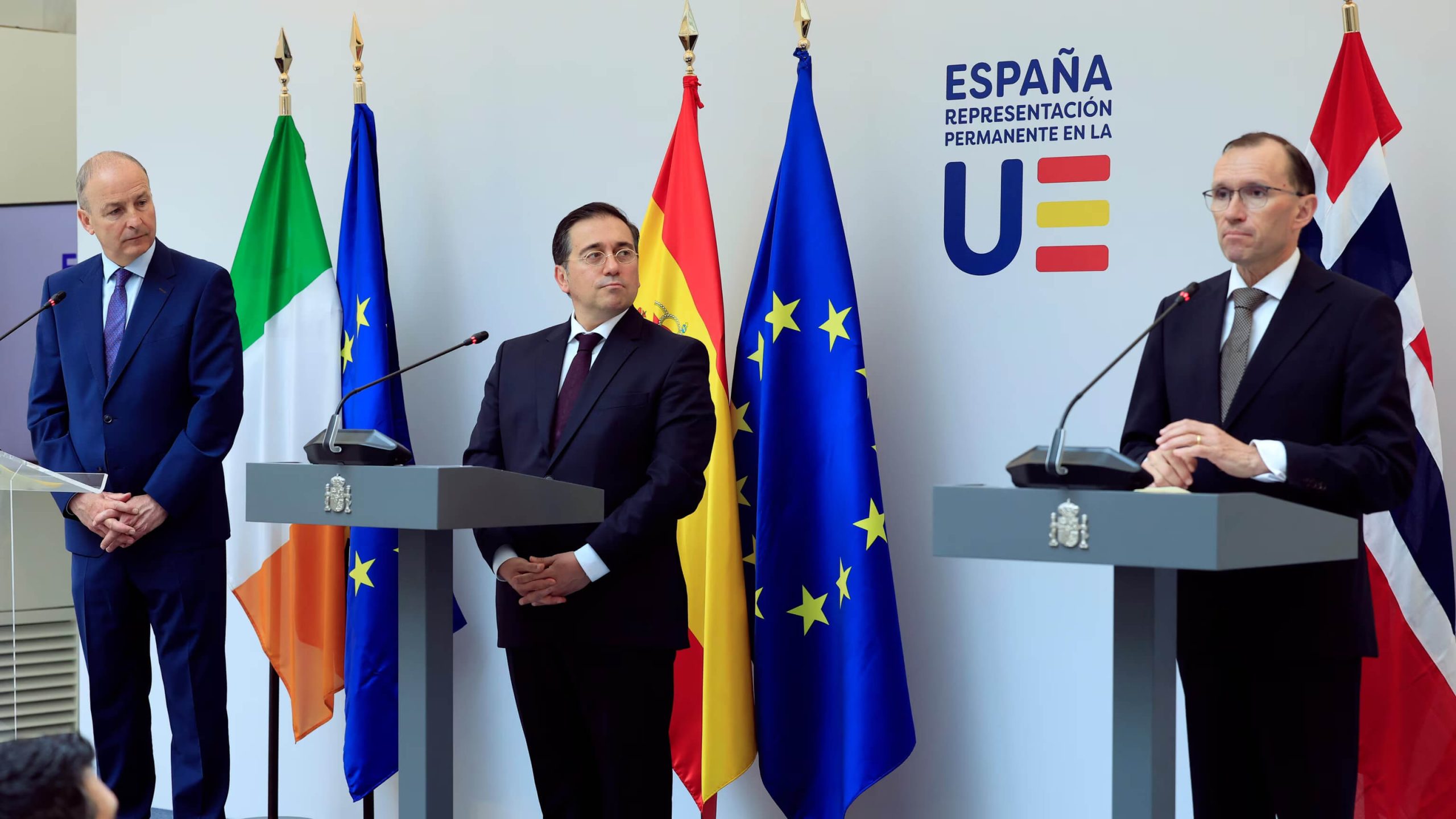LONDON — The showdown between Vice President Kamala Harris and former President Donald Trump will in many ways be a choice between foreign policy continuity and change.
Harris has largely stuck to President Joe Biden’s world agenda, one in which the outgoing leader sought to revive traditional American statesmanship after four turbulent years of Trump.
Biden’s time in office, though, has seen a major deterioration in global stability. The next president will come to power in the midst of two major wars — one in Europe and one in the Middle East — in which the U.S. is deeply involved.
Trump is bidding for a second term with twin promises of “America first” with “peace through strength,” accusing Biden, Harris and many other leaders of facilitating global instability through weakness and incompetence.

This combination of pictures created on Oct. 30, 2024 shows Vice President Kamala Harris on Oct. 30, 2024, and former President Donald Trump on Oct. 29, 2024.
Angela Weiss/AFP via Getty Images
The Democratic ticket is framing Trump as a chaotic leader easily taken advantage of by more wily foreign adversaries.
As Americans head to the polls on Tuesday, the world will be watching as closely as ever.
Russia and Ukraine
Russia’s war on Ukraine has dominated Biden’s presidency. In the early days and weeks, his administration stood behind Kyiv as Ukrainian troops stubbornly halted President Vladimir Putin’s grand military gambit.
The White House has since sought to pick a path that ensures Ukrainian survival and inflicts strategic defeat on Russia, without dragging the U.S. and its NATO allies into a potentially nuclear confrontation with Moscow.
The balancing act has prompted criticism from Kyiv, with leaders there frustrated by stalled ambitions for NATO membership, the speed of weapons deliveries, the quality of arms provided and geographical restrictions on their use.
Harris appears in lockstep with Biden’s Ukraine policy. “I have been proud to stand with Ukraine,” the vice president said in September. “I will continue to stand with Ukraine. And I will work to ensure Ukraine prevails in this war.”
Oleksandr Merezhko, a member of the Ukrainian parliament and the chair of the body’s foreign affairs committee, told ABC News, “The fate of Ukraine depends on the U.S., on its military aid and — perhaps most importantly — on its leadership.
Frankly speaking, I want these elections to be over, because after the elections we will have a more or less certain picture of what we can count on and what the U.S. policy toward Ukraine will be,” he added.
Trump’s longtime public praise of Putin and past impeachment linked to Ukraine prompts concern in Kyiv, as do his proposals for a quick peace settlement that may hand Moscow control of swaths of eastern Ukraine and block Kyiv from future NATO membership.
Ukrainians will be hopeful that Trump’s campaign trail rhetoric will morph under the weight of the Resolute desk.
To me they have different mindsets — Harris has a legalistic worldview because of her professional background, and Trump has an economic worldview,” Merezhko said. “But they might come to the same policy regarding Ukraine.”
That’s why we need to find persuasive enough arguments for Trump,” Merezhko said, for example framing support for Ukraine as an economic boon for the U.S. and its failure as inflationary for NATO’s eastern deterrence efforts.
Pavel Luzin, a Russian political analyst at The Fletcher School of Law and Diplomacy, told ABC News that Russia is “definitely putting its bet on Trump.
People in the Kremlin believe that he will become a factor of turbulence in military aid to Ukraine, in relations with NATO allies and domestically here in the U.S.,” he said.
The Middle East
Hamas’ Oct. 7, 2023, attack into southern Israel spawned a conflagration that has since spread to include seven fronts — a number of which have seen American forces engaged in direct combat with Iran and its regional proxies.
The presidential election will take place with vicious fighting ongoing in Gaza and in southern Lebanon, while Israeli airstrikes pummel what the Israel Defense Forces calls terrorist targets across Lebanon and the Gaza Strip — all while dozens of Oct. 7 hostages, among them four Americans, remain unaccounted for in Gaza.
Biden’s apparent lack of sway over the issue has frustrated pro-Palestinian and pro-Lebanese groups in America — particularly Arab Americans and other ethnic minority groups — and emboldened Trump, who has attacked both Biden and Harris as weak.
Hafed Al-Ghwell of the SAIS Foreign Policy Institute research center told ABC News that the stakes of the coming election are enormously high” for the Middle East, though he added, “U.S. unequivocal support for Israel is never going to change, no matter who is the president.
If Harris wins, she may moderate a little the Biden administration’s approach to the Israeli war on Gaza and Lebanon,” Al-Ghwell added. “But I doubt very much she’s going to shift gears on it in any major way.”
Trump’s Middle East record includes the controversial decision to move the U.S. embassy from Tel Aviv to Jerusalem, his withdrawal from the Iran nuclear deal — officially known as the Joint Comprehensive Plan of Action — and subsequent “maximum pressure” campaign on Iran, the Abraham Accords and his unrealized “deal of the century” peace plan. All major initiatives aligned closely with Israel’s — and usually Israeli Prime Minister Benjamin Netanyahu’s — interests.

Palestinian children gather at a destroyed vehicle in Khan Younis in the southern Gaza Strip, on Oct. 27, 2024.
Mohammed Salem/Reuters
“Trump is not going to be any different than the Trump we saw before,” Al-Ghwell said, though he added that is not necessarily a hindrance in conducting regional affairs.
Most of the Arab governments seem to like Trump,” he said. Some Arab governments like him because he is a transactional guy. They can deal with him without having to deal with a president who lectures them on values of democracy and human rights.
China and Taiwan
Trump and Biden contested the 2020 election trying to out-do each other on Chinaboth seeking to project the image of a leader willing and able to face down one of America’s most pressing strategic challenges.
Harris, the Lowy Institute think tank suggested in October, “is largely a blank slate on China policy. She is likely to stick to Biden policy positions and instincts, which means relations will remain rocky.”
“Chinese experts have publicly proclaimed that whoever the winner is, both candidates are ‘poison’ for China,” the Brookings Institution think tank’s Yun Sun wrote in May when Biden was still the expected Democratic candidate.
Biden’s approach “might bring more stability to bilateral relations, but his competition strategy has been quite effective economically and diplomatically, leaving China’s high-tech industry and diplomatic offensive in limbo,” she said.
Trump’s pugnacious brand of foreign policy may work in Beijing’s favor, she added, noting that the former president’s “position on U.S. alliances and partnerships and the damage he might cause serves Beijing’s strategic agenda in the long run.
As with Russia and North Korea, Trump twinned his aggressive posture with praise of China’s leader. President Xi Jinping, he said, was “brilliant,” and a “top of the line” president who ruled with “an iron fist.”
But despite his apparent admiration for Xi, Yun wrote that Trump’s “unpredictability and his use of maximum pressure will put China in extremely difficult corners, making him the less desirable option from China’s perspective.

This screengrab taken from handout video footage released by China’s People’s Liberation Army Eastern Theater Command on Oct. 14, 2024 shows a fighter jet taking off from the Liaoning east aircraft carrier of Taiwan during military drills.
Handout/THE EASTERN THEATER COMMAND OF CHINA’S PLA
U.S. policy on Taiwan — which Beijing considers an inextricable part of China despite the island’s independence since 1949 — is a major consideration.
The available evidence suggests the likeliest scenario would be one of broad continuity from the Biden administration” if Harris wins the election, Richard C. Bush and Ryan Hass wrote for the Brookings Institution in October.
Still, Harris has been avoidant on committing to defending the island against China aggression — as Biden has done — which may raise concerns. Bonnie Glasser of the German Marshall Fund wrote in September that Harris may opt for “strategic ambiguity” on the issue.
Trump unsettled Taiwan by suggesting the country pay the U.S. for its defense and more recently accusing the island of stealing the U.S. semiconductor chip industry.
Taiwanese are of course very concerned about the U.S. presidential election, for it impacts U.S.-China relations and Taiwan stands on the very frontline of that bipolar strategic rivalry,” Wen-Ti Sung, a political scientist based in Taipei, told ABC News
“Too much remains uncertain,” Sung said. “Harris will likely be a comforting continuation of the Biden-Harris administration’s policy towards Taiwan. The familiarity with each other’s personnel, processes and priorities between the Democratic administration and Taiwan has the psychological benefit of familiarity.”
When asked about the threat, Zhu Fenglian — a spokesperson for China’s Taiwan Affairs Office — said in a press briefing on Oct. 30 without naming Trump that an “American first” posture means “Taiwan at any time may turn from a pawn to a discarded child.
North and South Korea
The U.S.-North Korea détente was arguably one of the more surprising developments of Trump’s time in office. He and Kim Jong Un went from slinging public insults and threats of “fire and fury” to exchanging warm letters over the lifetime of the Trump White House.
The president attended a Singapore summit with Kim in 2018 and even crossed into the Demilitarized Zone between the two Koreas to shake hands with the North Korean leader in 2019.
Trump perturbed Seoul by demanding it contribute more funds to support U.S. troops stationed in South Korea. The Biden administration signed a five-year cost-sharing agreement with Seoul in October, but there is a chance Trump might look to renegotiate the deal to put his stamp on it as president.

This picture taken and released from North Korea’s official Korean Central News Agency on Oct. 31, 2024 shows the launch of an ICBM during a test-fire at an undisclosed location in North Korea.
Str/KCNA VIA KNS/AFP via Getty Image
Jong Eun Lee of North Greenville University wrote in The Diplomat last month of concern among conservative South Koreans that Trump may agree to deals with Kim that undermine Seoul’s position, especially if they in any way acknowledged Pyongyang’s nuclear status or reduced U.S. troops numbers on the peninsula.
In July, Trump suggested he would look to revive dialogue with Pyongyang if he returns to the Oval Office. It’s nice to get along with somebody that has a lot of nuclear weapons or otherwise,” Trump said while accepting the Republican nomination. He’d like to see me back too,” Trump said of Kim. “I think he misses me.”
North Korea’s state-run Korean Central News Agency’s response was not so effusive.
Even if any administration takes office in the U.S., the political climate, which is confused by the infighting of the two parties, does not change and, accordingly, we do not care about this,” the KCNA wrote.
NATO and the European Union
Trump’s public NATO-skepticism was a key element of his international image in his first term, and a repeated subject of criticism by Atlanticists on both sides of the ocean. It was perhaps in this arena that Trump’s transactionalist foreign policy was most pronounced.
Trump’s demand that NATO nations pay their “fair share” was not a new gripe from the U.S. — concerns about “burden sharing” have been constant through American administrations since at least President Barack Obama came to power, resulting in the 2014 2% of GDP military spending pledge signed by all allies.
But Trump’s approach to the problem was novel. According to administration officials including former national security adviser John Bolton, the former president even threatened to withdraw the U.S. from NATO — a step that would be catastrophic for the alliance — unless other members quickly and publicly increased military spending.
The alliance has significantly increased that spending, particularly since the beginning of Russia’s war on Ukraine. But Trump has not let up while on the campaign trail, continuing to undermine the collective defense commitment that serves as the foundation of the bloc.
Liana Fix of the Council on Foreign Relations said in July that NATO under a second-term Trump would be “less a value-based alliance, and more a pay-for-service business deal.
The Biden administration has, like its predecessors, pushed NATO allies to meet their military spending commitments. Harris may well maintain the pressure, though likely with more carrot than stick.

Soldiers sit on a tank during a press conference at the P7 military base in Revingehed, Sweden, on Oct. 24, 2024.
Johan Nilsson/TT News Agency/AFP via Getty Ima
“As President, I will stand strong with Ukraine and our NATO allies,” Harris said when accepting the Democratic presidential nomination in August.
The vice president criticized Trump’s stance, suggesting in a February speech that “some” people look to “flout common understandings among nations, to embrace dictators and adopt their repressive tactics, and abandon commitments to our allies in favor of unilateral action.
Many NATO allies are also members of the EU, with which Trump also has notable political and economic grievances.
Many of Trump’s stated policies would directly harm European economic interests, upset the global economic order on which the EU relies and undermine European objectives in areas like climate change,” the Centre for European Reform think tank wrote last month.
It noted a recent Goldman Sachs estimate that Trump’s stated policies could chip away as much as 1% of Europe’s GDP.
A Harris victory “would in most respects represent continuity with Biden’s,” the CER wrote in another report.
“But even a Harris victory would not save Europeans from difficult choices over how to support Ukraine, or alter America’s gradual tilt away from Europe — though it may slow it temporarily,” that report noted.










